MHS opened its doors in 1993 to students for the first time. Alumni, staff and their children share their memories and what MHS means to them.


See pgs. 8-9


MHS opened its doors in 1993 to students for the first time. Alumni, staff and their children share their memories and what MHS means to them.


See pgs. 8-9

Anvi Talyan
Elliott Jorgensen
Willem Hummel
David Moss
Eli Ferguson
Emily Chien
Aubrey Lacavich
Hailey Neuner
Claire Lowder
Layla Shockley

Luke Graves
Aiden Burkhardt
Kate Jesperson

Justin Small
Emily Jorgensen
04 MO DRIVING LAW Under this law, drivers cannot type, write, send or read any text-based communications.

06 THEATRE ACHIEVES HONORS TROUPE

The Marquette Theatre Company’s International Thespian Society is now an honors troupe.
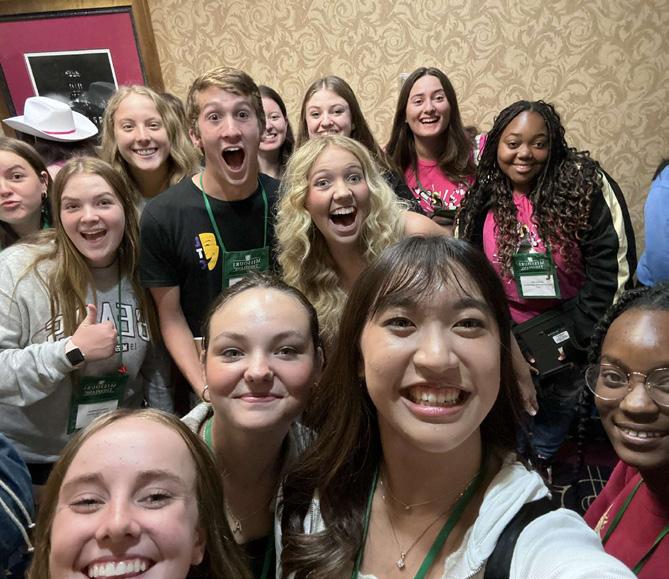
07 BAND ALUMNI RETURN This year’s Homecoming game will host alumni band members.
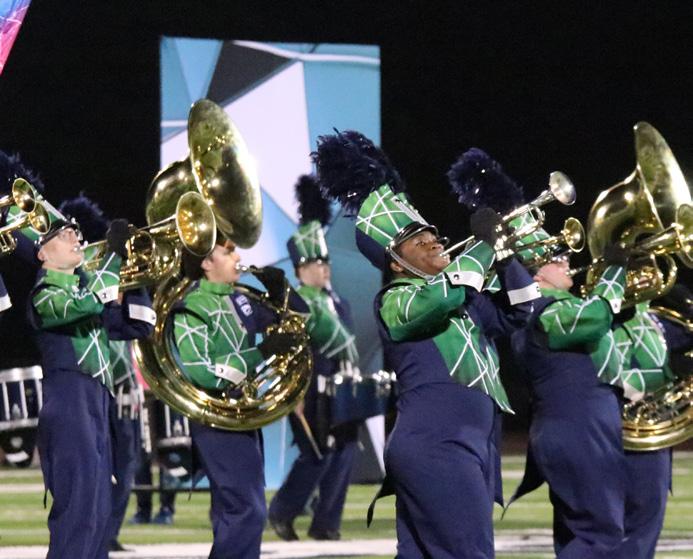
11 SELF-TAUGHT GUITAR Multiple students and staff have taught themselves how to play guitar.
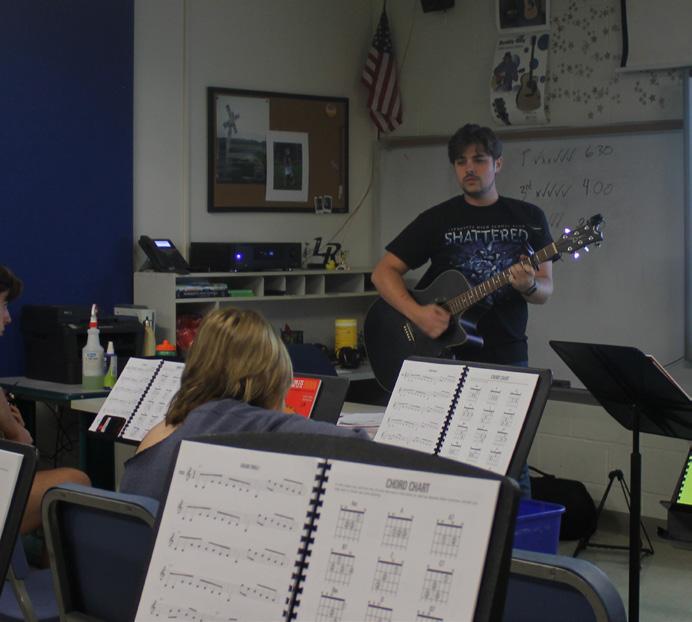
14 BATON TWIRLER PERFORMS SOLO Sydney Moroney, junior, performs with cheerleaders during football games.
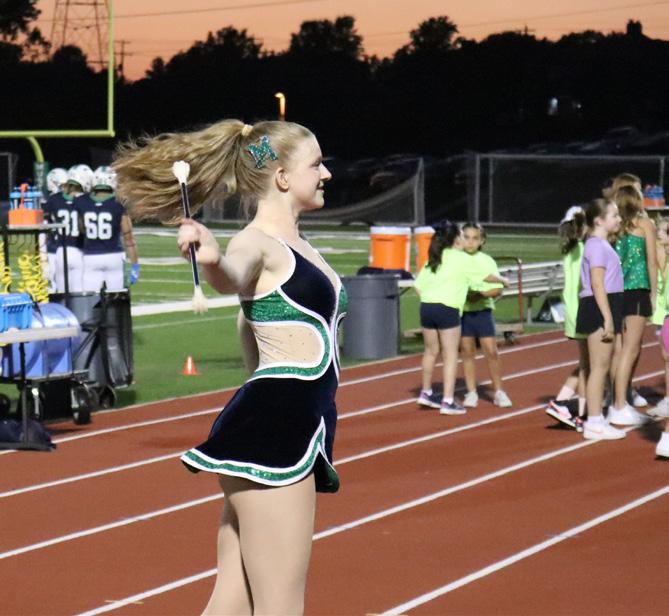
Photographs by Harris Ellington, Elliott Jorgensen, Kiera Leung, Emily Chien, Luke Graves

Front photograph by Elliott Jorgensen
Front photo illustration by Annabelle Miller
The Messenger is a public forum, published eight times a year by students in the News Production class at Marquette High School, Chesterfield, MO, 63017. The publication serves to inform readers about issues concerning the community.
Opinions of Messenger columnists or the Editorial Board are not representative of the opinions of the entire Messenger staff or the administration. The full student publication policy can be viewed on the Messenger official website, marquettemessenger.com.
The Messenger takes responses for any issue. Send these to yourmhsnews@gmail.com. The Messenger reserves the right to edit submitted material and to refuse to print material because of space limitations, repetitive subject matter,



libelous content or any other reason the editor in chief and adviser deem appropriate, including advertisements and letters to the editor.
The Messenger is nationally recognized as a member of the National Scholastic Press Association (NSPA), Columbia Scholastic Press Association (CSPA), the Journalism Education Association, Missouri Journalism Education Association and Quill & Scroll. This year, the publication was named a Hall of Fame recipient and Quill & Scroll George H. Gallup award winner. Past issues have been named NSPA Pacemaker finalists and CSPA Crown finalists. The Messenger website is a Distinguished Site recipient. The publication office is located in Room 226, (636) 891-6000 ext. 26228.
by | Rhianna Li by | Elliott JorgensenAs journalists who strive for accuracy, objectivity, balance and credibility, we stand to bring the school community together by featuring stories that inform, entertain and inspire with an emphasis on giving a voice to the school community.
Noah Southerland, sophomore, missed school on a Thursday and Friday due to illness and recovered over the weekend. He said it was fortunate his illness overlapped with a long holiday weekend.
“It’s definitely a little bit troubling that if something like that were to happen again, I would have been in a comparatively bad place,” he said.
This is because this school year, the administration has changed attendance and Ac Lab policies to crack down on students who are repeatedly missing school or who are late to class. One such change is teachers have been asked to no longer teach lessons during Ac Lab to students who missed class.
Southerland said changes such as this may have some unintended consequences.
“In a lot of circumstances, when somebody is absent from school it’s out of their hands,” he said. “It shouldn’t be a punishment upon them.”
Sophomore Principal Kyle Devine said the administration is also cracking down on tardies and absences this year.
“When kids are out of class, they’re not getting the information that they need to be successful. That teacher is now having to find a way, a new way, of trying to get that information to the student,” Devine said.
Devine said the school needs structure and organization to make sure students are where they need to be at the correct time.
He said every Friday the grade level offices will push out tardy warnings to students. Disciplinary action will be taken if a student meets or exceeds three tardies.
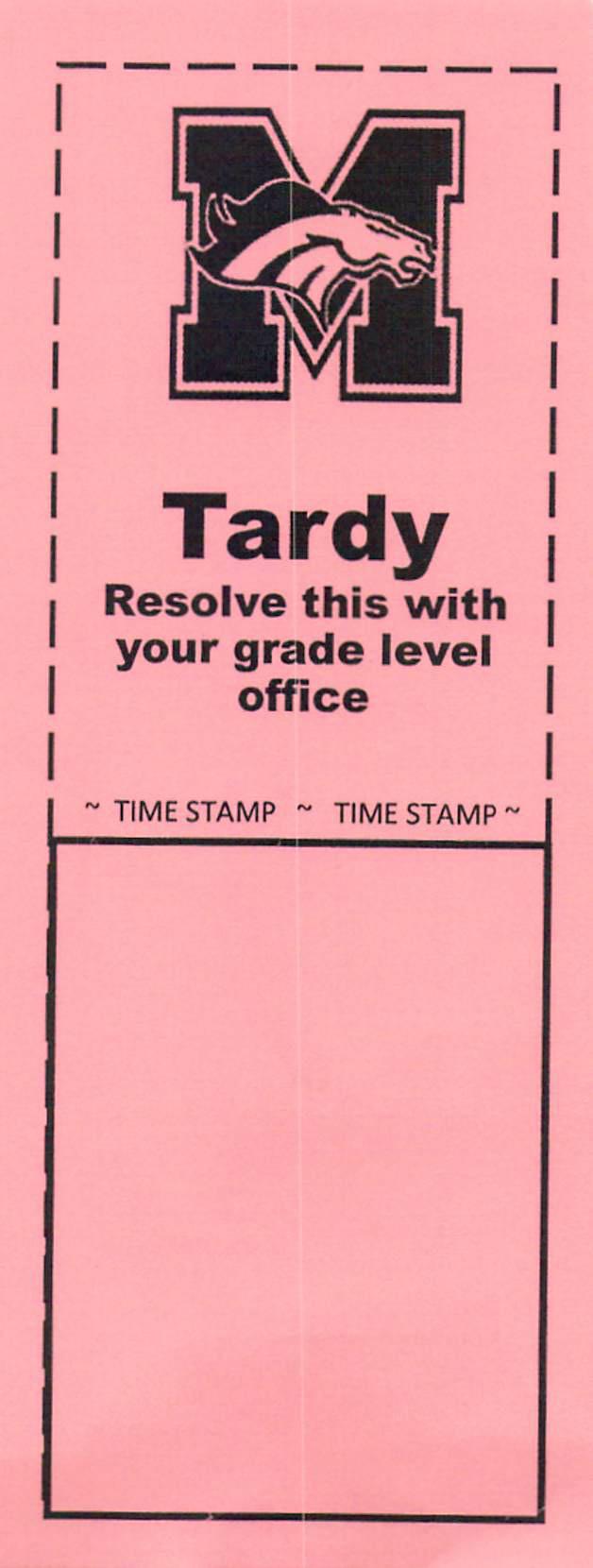
Last year Devine found that repeated absences were from the same
students.
“It’s always that same exact kid who’s disrupting the other 30 kids trying to learn.” Devine said.
Darcy Hachmeister, math department chair, said it is important for students to be on time in her class because she starts right when the bell rings.

“If I am starting a new lesson, they miss that initial foundation that sets up the whole lesson, so then they are going to be behind,” Hachmeister said.
Hachmeister said some of her students completely miss class because they think they can just use the online notes or watch videos to learn the material.
She said she purposefully does not post videos or filled-in notes anymore
to encourage her students to come to class.
“If they are not there, they miss the little nuances that I talk about, those problems off to the left or to the right, where it’s a discussion and not me just doing problems up on the board,” Hachmeister said. “There is so much more learning and understanding happening in the classroom versus just copying down notes or watching a video.”
Hachmeister said she hopes students will do what they are supposed to do.
“School is not about roaming the halls or skipping class. It’s about getting in the classroom and learning,” Hachmeister said.
While browsing the district calendar, Aniskha Bhatia, junior, was disappointed to see that MHS and Lafayette are holding Homecoming on the same day, Saturday, Sept. 23, as her date goes to Lafayette.
“It’s just annoying because I feel bad that he has to come here and miss out on his own homecoming,” Bhatia said.
Though she had been excited to attend both dances, Bhatia said she and her date decided to attend MHS’ Homecoming.

Having to compromise was frustrating, Bhatia said, and she found it unfair.
“The schools are so close in distance, so obviously there’s going to be a lot of dates and relationships with people from across the two schools,” Bhatia said.
Though this date has caused issues for students, the Activities Director Adam Starling, said this decision wasn’t up to administration.
Starling said the dance is based on
Ac Lab sign up returned to a noon cuttoff on Responsive Scheduler, replacing the 8:30 a.m. deadline set earlier this year.
The administration has added two opportunities for students to earn community service hours during Ac Lab. Students who sign up during Mod 1 will sweep halls and stairwells while students who sign up for Mod 2 will clean up campus.
The MHS community donated 52 units of blood at the Monday, Sept. 11 Blood Drive, which will help 156 people.
home football dates, which are set on a two-year cycle by the Missouri State High School Activities Association (MSHSAA). With only four home games this year, Starling said Saturday, Sept. 23, was the only date that worked for the three-week period Homecoming is always held in.
“You can’t make Homecoming the first game,” Starling said. “And then toward the end of the season, now you’re getting too late to have a homecoming.”
Starling also said each school has its own activities and events to plan around.
“Everything’s decided in-building,” Starling said. “So we don’t consider their building calendar and they don’t look at ours.”
Sam Barton, sophomore, found himself in the same position and has had trouble planning around the inconvenience.
“It’s a huge mess,” Barton said.
Barton said he decided to go to both dances so they can both have fun with their friends at their own dances. They plan to go to MHS first, and then LHS.
MHS had the most National Merit Semifinalists in the state with 23 finalists. Hispanic Heritage Month runs Friday, Sept. 15, through Sunday, Oct. 15. This month recognizes the contributions of Hispanic Americans to history, culture and achievements of the U.S.
The library will recognize Freedom to Read Week Sunday, Oct. 1, through Saturday, Oct. 7.
NewThis Year:
Teachers used to handle tardies, but now the gradelevel offices are taking over.
In the last five years, Rockwood School District (RSD) has spent over $40M on bond interest to maintain and update security, technology and facilities.
In order to alleviate these debts efficiently, Proposition 3 was created in 2016 and added to RSD’s “The Way Forward” plan.
If passed, the plan would occur in two phases, according to RSD. Initially, 36 cents would be moved from Debt Service to Capital Projects in the tax year 2024, followed by 18 cents in the tax year 2025.
In the first year, this transfer would generate approximately $17 million for safety, technology and facilities.
parent with my students in informing them that when you become a voter, here are the types of things that you can vote on.”
Principal Dr. Tracey Waeckerle said this year’s freshmen came in with their old middle school computers because there wasn’t sufficient funding in order to provide them with new ones.
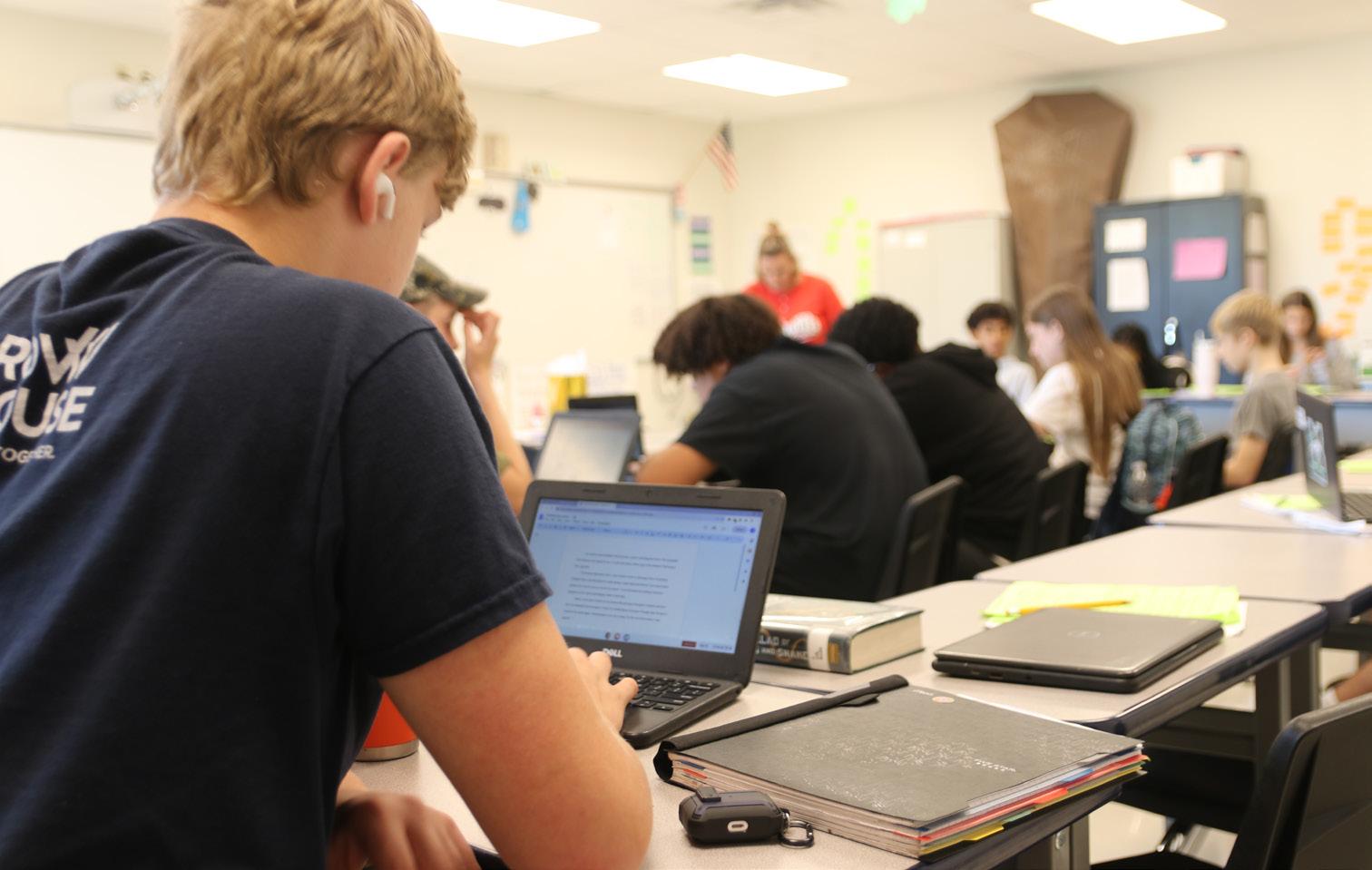
The bill would also play a role in building maintenance, especially in regard to air conditioning and security measures.
The district is hosting a Community Informational Town Hall at 6 p.m. Tuesday, Oct. 3, at MHS.
The following year, once the transfer is fully phased in, $26-27 million would be generated annually for cycle updates and maintenance. This would be accomplished without raising the district’s tax rate.
Emily Thompson, world language teacher, said many teachers still have old computers and some don’t even have smart boards in their rooms.
In addition, many students at the elementary school level do not have Chromebooks.
“It’s not that I’m upset that I’m missing anything, that I don’t have resources, I’m upset that my students don’t have resources,” Thompson said. “Because it’s not us going without, it’s the students going without, and I don’t think that the community always sees that when they see stuff on a ballot.”
Thompson is also a member of the Rockwood National Education Association (RNEA), whose mission is to advocate for students through the representation and support of teachers.
“In previous elections, I have gone knocking door to door and making phone calls to inform people of bills,” Thompson said. “And I’m very trans-
“You are voting for something that is very necessary, not just for fun,” Dr. Waeckerle said. “It’s always so important for people to do their research and be educated voters before going to the polls to vote for anything.”
How would Prop 3 help the district?
“Restructuring the tax rate will provide debt-free resources for safety, technology and facilities without increasing the tax rate.”
- Rockwood School District
This includes,
• Fund improvements to safety & security
• Updates to technology devices & infrastructure
• Buildings & equipment maintenance
• Coverage of general operating expenses
david MOSS
Addison Thurston, senior, almost never looks at his phone when he’s behind the wheel, but Thurston can’t say the same for other drivers he’s encountered on the road.
“Some drivers will try to merge into my lane because they’re distracted by their phone,” Thurston said. “I’ll need to either swerve to get out of the way or honk to make them aware.”
In hopes of addressing this dangerous issue, a new Missouri Law bans all drivers from holding a cellphone while driving. Previously, this only applied to drivers under 21.
The “Siddens Bening Hands Free Law,” named in memory of two Missourians who lost their lives in traffic crashes, took effect Monday, Aug. 28.
some people obeying stop signs? It’s like any other law out there: the driver has to choose whether or not they will comply with it.”
Edward Ter-hovhannisyan, junior, said he sometimes needs to utilize his phone while driving.
“There are times when I have to get back home quickly, so I pull out my phone for Google Maps in case there’s an exit coming up that I need to take,” Ter-hovhannisyan said. “If I were to stop in the middle of the highway and pull onto the shoulder, that would be very dangerous and a real time-waster.”
Fast Fact
According to the National Highway Traffic Safety Administration, 3,522 people were killed by distracted driving in 2021.
Adrian Washington, public information officer, said the St. Louis County Police Department, like other Missouri police departments, will not heavily enforce this law yet.
“It doesn’t go into full effect until 2025,” Washington said.
Once the law is strictly enforced, it will be prohibited for drivers to hold/ support a cell phone or other wireless device; manually type, write, send, or read any text-based communication; or watch, record, post, send, or broadcast a video. The law does not apply to Bluetooth or voice-activated features.

Officer Washington said this law will only create positive change for the “better percent” of drivers.
“When you’re driving, how well do you see people obeying traffic laws?” Washington said. “Do you see everyone obeying stop signs, or do you see
Ter-hovhannisyan said he often listens to music while driving and uses his phone to change songs. Outside of these situations, Ter-hovhannisyan doesn’t often use his phone while driving and recommends that drivers avoid texting and using social media.
In the MHS parking lot, Junior Principal Melissa Davis said it’s a priority to ensure everyone is following the rules and no one is distracted or on their phone.
“Our parking lot is very busy; all of our parking spots are filled,” Davis said. “We have juniors and seniors who are parking, we have parents who come to pick up and we have students walking across the crosswalks, so paying attention is very important.
Davis hopes people will abide by the Hands Free Law, as phone use is extremely distracting and dangerous when combined with driving.
“If it’s a law in Missouri, then you have to abide by it here,” Davis said. “We want everybody on our campus to be safe.”

The College & Career Center began offering college application workshops this semester during Ac Lab for seniors who may need support completing their college applications.
“This could be useful for students who don’t have time outside of class to get help with their college applications,” Layla Torgoley, College & Career Center counselor, said.
Torgoley said the goal of the program is to provide a time for seniors to ask questions regarding their college applications without needing an individual appointment that can be time consuming and unachievable for busy students.
Most college application deadlines are January through February, but Early Decision is due Wednesday, Nov. 1, this year. Early Decision allows applicants to receive admittance decisions early and is praised for reducing stress during students’ senior year.
Although it may vary, the college application process typically takes about six to eight weeks to complete, and with experts recommending applying to four to eight schools, the process can quickly become lengthy.
“There will be 6 to 12 students per session until we gauge how many people are interested,” Paula Ake, College & Career Center counselor, said. “If we see more people are interested, we may open it up.”
Students sign up for the workshop
through Infinite Campus’ Responsive Scheduler by claiming a spot in Ake’s Ac Lab. The workshops will only be held during first semester. The only currently scheduled workshops are on Wednesday, Nov. 8, and Monday, Dec 4.
Tara Deshpande, senior, said she is likely to attend a session.
“It seems helpful to have a professional look over my applications,” Deshpande said. “I would definitely attend a session.”
Ake and Torgoley said they know
be confusing and stressful, but want all students to know they can help.
Also held during Ac Lab are visits from college representatives. This past Wednesday, during Mod 2 of Ac Lab, representatives from the University of Missouri - Columbia met with students.
Students can access a calendar of college rep visits by logging into the SCOIR website and going to “Visits and Deadlines” under the “Me” tab. Only juniors and seniors are allowed to register and space is limited.
• Make a list of colleges you plan to apply to ranging from easily attainable to more selective schools.
• Create a list of questions to ask on college visits.
• Sign into and utilise your SCOIR account for college visits and applications.
• Enrol in/work toward the A+ Program.
• Look for free scholarship opportunities locally and on trusted websites.
Check the College & Career Center on MHS’ website for more resources and information.

The Marquette Theater Company (MTC) puts on three shows a year: one fall musical, student directed one acts in January and a spring play. However, this year, there will be an extra play added in the fall: “The Glass Menagerie.”
“The Glass Menagerie” by Tennessee Williams follows the lives of a family who lived in St. Louis during the 1930s. This story is told through the narrator Tom Wingfield, who is played by Stephan Bosnjak, junior.
Tom is a writer who’s trying to make it big. But he also has to work at a warehouse to support his mom and his sister. The play is told through Tom going back in time to tell the story of his family.
and different,” Anvitha Rani, junior, said. This year “The Glass Menagerie” will be held from Friday, Oct. 6, through Sunday, Oct. 8. The annual musical, this year “Footloose,” will follow on Thursday, Dec. 7, through Sunday, Dec. 10.
The structure of the play is also different from most. The cast only consists of four main actors, a male and female understudy, and a few stage managers.
The stage will include a 20-foot ratio revolve, a spinning stage, for quicker set changes and smoother flow, similar to “Hamilton” and “Les Misérables.”
This play is unique in that it is being performed by members of The International Thespian Society (ITS), a theater honor society for high school and middle school students, to an audience of only 100.
“The goal is also to get this play ITS adjudicated, and in order to have a chance to perform this play at the [Missouri ITS], we need to get everything set up now,” Bosnjak said.
Students need 10 credits to get into ITS and they earn five credits per show. The majority of “The Glass Menagerie” cast are members of this organization.

“I am excited to be a part of something so unique
The audience seating arrangement within the theater also will be different with seats on the very front of the stage itself. Then on each side of the actors, there will be additional seating. The tickets will be general admission and $5 each. The show is also PG-13 and not recommended for those under 13.
MTC is also building a 20-foot revolve, which is a circle with a 20-foot radius. This allows the whole set to rotate. This set design also will make it possible for the main character and narrator Tom to better portray the act of going back in time to tell the story of his family.
Rebecca Blindauer, theater teacher, said “The Glass Menagerie” is one of her favorite plays because of its connections to St. Louis.
“I think that the cast is tremendously talented and it’s such a beautiful play,” Blindauer said. “It gives the students another option to grow their skills in a different kind of way. We are all just pouring our heart and soul into it.”
Officers of Marquette Theatre Company (MTC) traveled to Jefferson City for the Missouri State Thespian Leadership Conference, representing the MHS Thespian Troupe #5424 this month and earned Honors Troupe status.
“It gives us a sense of accomplishment, and it makes us feel more confident going into this year,” Riley Gregory, junior, said.
Gregory, secretary of MTC, participated in clinics to improve her leadership skills.
“I learned about bringing women around you up and empowering them, and that was really cool,” Gregory said.
Honors is the highest status an Interna- tional Thespian Society (ITS) troupe can receive.
Gregory and junior Drew Mathers, vice president, presented their fundraisers and achievements at the conference
“We were excited to attend this year because MTC hasn’t been since 2015,” Mathers said. “It was everyone’s first time going.” Rebecca Blindauer, theater director, was happy to attend this year’s conference.
“There was a lot of excitement amongst our officers to share what they learned with the group,” Blindauer said.
In preparation for the State Thespian Conference, MTC decided to submit the “Glass Menagerie,” the current play, which will run Friday, Oct. 6, to Sunday, Oct. 8, for review.
Two to three adjudicators will be sent to MHS to watch the production, and if they decide it’s something they want the state to see, the play will be performed in Kansas City during the (ITS) Conference in January.
“We’re putting ourselves out there so we can receive as many opportunities as possible,” Blindauer said. “To perform in Kansas City would be a huge honor.”
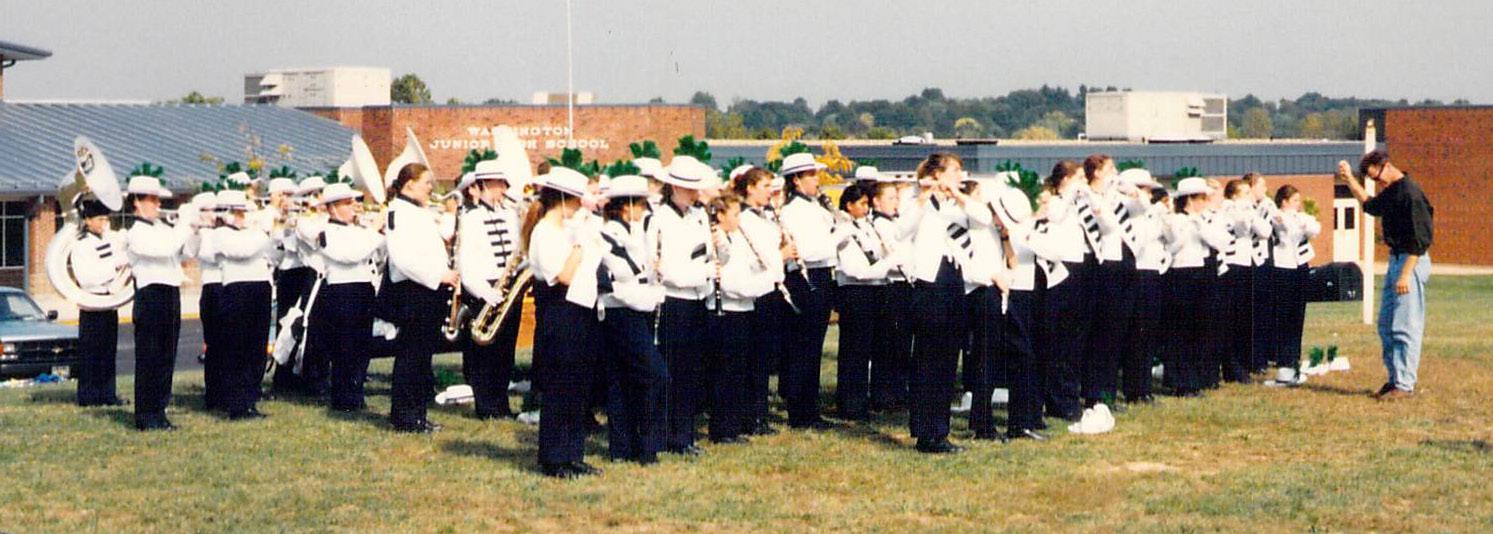
justin SMALL
Current band students and alumni will take the field to perform at tonight’s Homecoming football game.
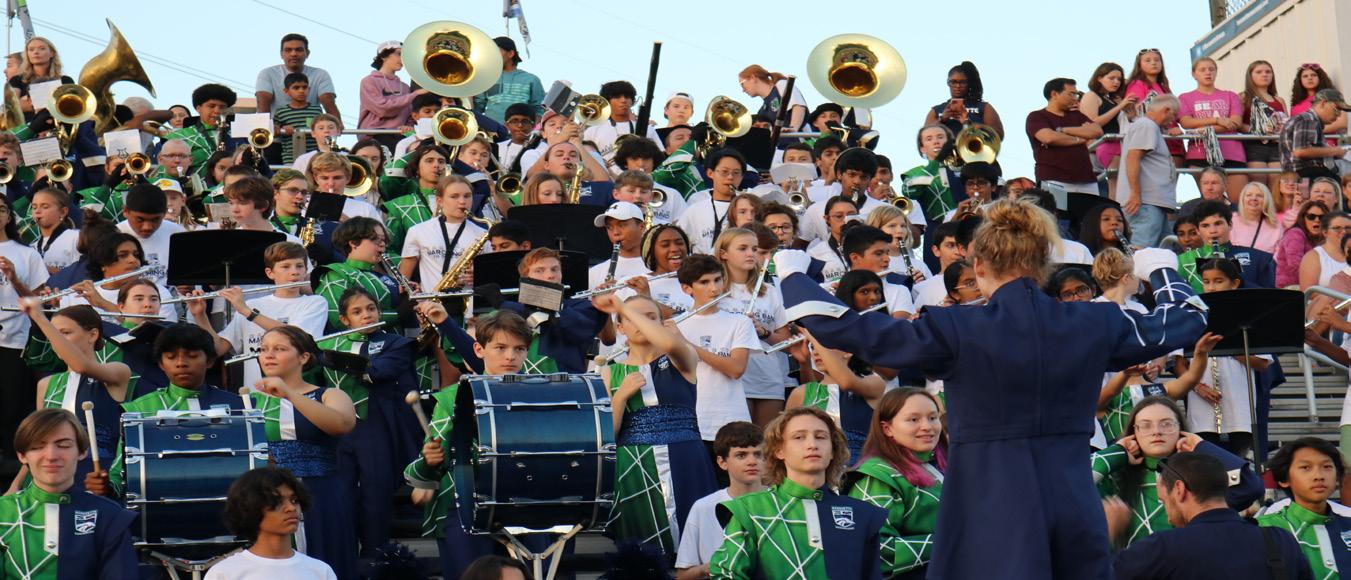
Alumni dating back to MHS’ first graduating class were allowed to register via a Google Form posted on the Marquette Bands Facebook page.
“We actually have alumni from 1996 coming back,” Christian Pierce, band director, said.
A total of 43 alumni have registered to perform tonight in the stands and on the field, but there is a likelihood that more could appear, Pierce said.
Alumni will bring their own instru-
ments except tubas and percussion will be provided at the game on a first come first serve basis.
Along with current students, the alumni will perform the “Notre Dame Fight Song,” “Go Big Blue,” “Mortal Kombat” and “Hey Baby.”
Participants paid $30, which included tickets to the game and a commemorative t-shirt.
Pierce said he is excited for current students to play and interact with past students and get a taste of MHS history.
“I had friends who went here when I was in high school,” Pierce said. “It’s gonna be cool to touch base with them again.”
Cameron Schuetz, junior, plays alto saxophone for symphonic band. Schuetz said he generally enjoys playing at the football games, but with alumni returning, he is looking forward to the Homecoming game in particular.
“It’s so much fun to sit up in the stands with your best friends and play really neat music,” Schuetz said. “We like to play really loud and scream with everybody else whenever they get a touchdown.”
Schuetz said he is excited to hang out with any old friends of his who have graduated.
“I think it’s really awesome. It’s nice to see them pop back in once in a
while,” Schuetz said.
Joey Buckner, junior, plays baritone saxophone and enjoys interacting with the students at every game and performing a variety of music to excite students.
“I look forward to just having fun with all of the band members,” Buckner said.
Buckner said he will enjoy playing alongside the band members he’s bonded with throughout his years in the band.
“I always love seeing our old band mates come back,” Buckner said.
The sounds of hammers hitting nails isn’t uncommon to Ayden Church, sophomore, who grew up surrounded by family interested in construction.
Church’s interest in building and engineering began when he was 5, and led him to take Algebra, Manufacturing, Productions, Entrepreneurship, and Design (AMPED) last year, and eventually Geometry in Construction (GIC) this year.
“I was told by the teachers that geometry and construction was the essential part to the two sides class,” Church said. “You do math and then you apply it.”
For the first time at MHS, the GIC class is building a tiny home, which Church said he is looking forward to.
“I know the basics, but I don’t know as much as I will by the end of the year,” Church said.
Zach Avila, GIC teacher, has taught
GIC along with Jeff Wallner since its start at MHS six years ago. During that time, most projects have been small sheds, three of which are utilized at MHS for tools, supplies and athletic equipment.
Avila said the movable tiny home project of this year is unlike any past build and presents many additional challenges. GIC classes have done some insulation, drywall and a small amount of electrical work, but nothing of this scale.

“It is going to be a bit of a learning curve; we haven’t done it before,” Avila said. “It has to be built stronger than the typical wood frame home because it has to withstand moving. There’s a lot of guidelines and rules about how pieces and parts are connected.”
The project also will have to be kept weather tight and constantly covered while building, as there are strict moisture regulations for homes, Avila said.
They are still about three weeks
out from starting the project. GIC has already covered safety and tool identification and are now moving into tool usage.
“We know the project is going to be a challenge, but I think it will be a great experience for the kids,” Avila said. “It’s one of those things that sticks with students throughout high school and beyond, which is something not every teacher can say.”
Once the home is completed, it will likely be auctioned off for roughly $30,000, which will cover the building costs.
Audrey Cox, freshman, took GIC for the hands-on component.
Cox said she wanted to be in an engaging and less formal math class than regular geometry, and has formed interest in construction as her family owns a farm for which they are often constructing items for.
On their farm, Cox said her family has built tiny houses before, so the
project caught her attention.
“It’s interesting because usually I can’t say that math is really boring,” Cox said. “I think it’s going to be really fun.”
At 5 a.m. on a fall morning in 1993, the final roll of carpet was installed in what was the skeleton of Marquette High School.
Two years prior, a $65 million bond issue allowed for the building of two new schools: Marquette High School and Rockwood Summit High School.
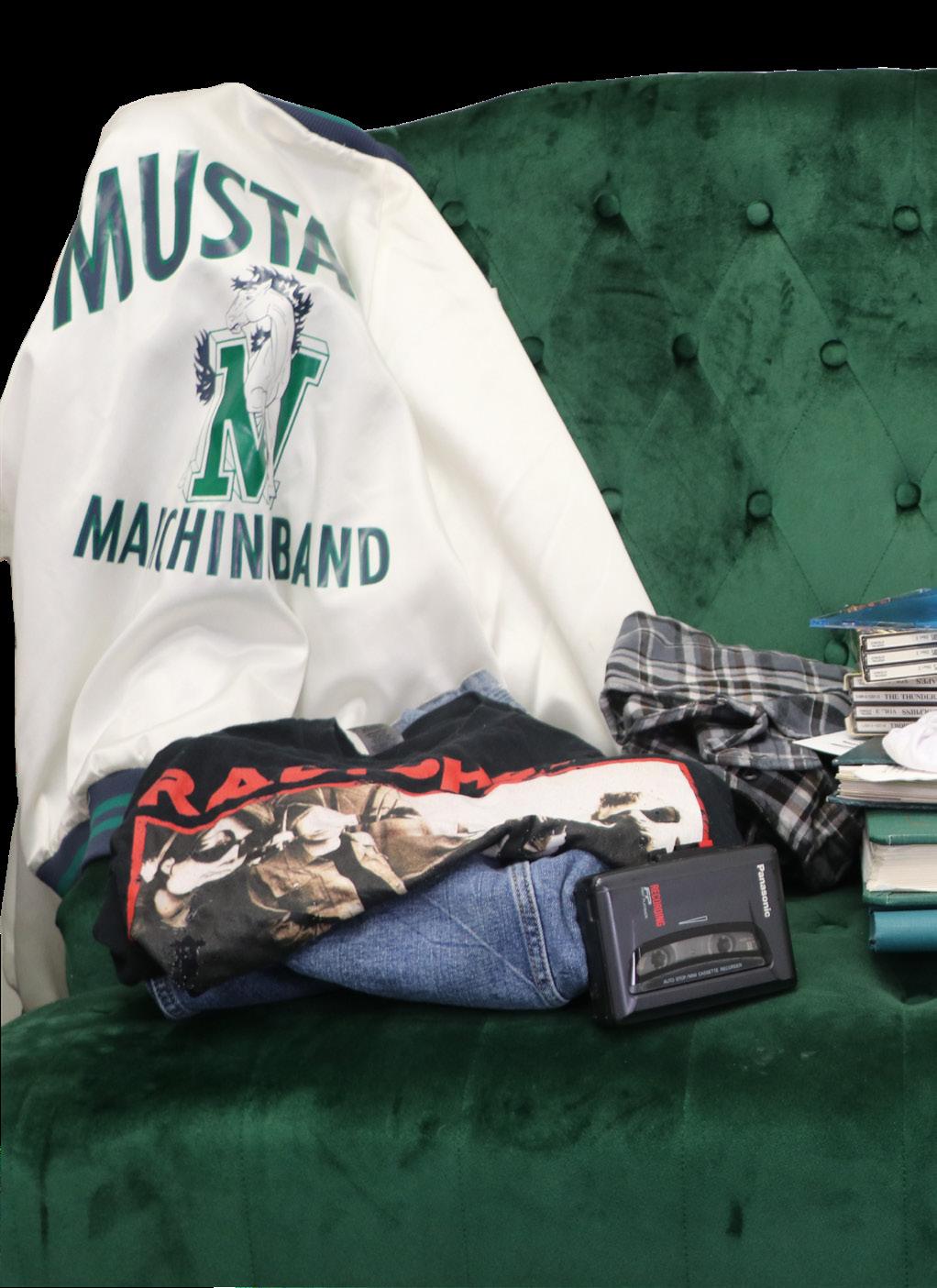
Jessica Hutchings, science teacher, entered the building 30 years ago as a student, and now returns as a teacher. Turning a corner on the third floor and entering her classroom, Hutchings is exposed to a space that did not exist during her time as a student.
This is Hutchings’ first year as an MHS teacher, and it also marks 30 years since the school first opened for the 1993-1994 school year.
“I think high school students, whether it be the 90s or today, are pretty much the same,” Hutchings said.
What has changed in the past 30 years is that multiple additions have been added to the school. The STEM-wing where Hutchings now teaches is only one of multiple additions that have been added to the school in the past 30 years. Other changes have included the new science wing, theater, G wing, leveling the Commons and expanding the Library.
While additions have been made, the student desks in Hutchings room have not changed in 30 years.
Hutchings also said a difference in the high school experience of today and hers of 30 years ago is locker usage.
“I was carrying around a billion textbooks, but I also used my locker. Kids don't use their lockers so much because it is digital,” Hutchings said.
Freshman Principal Dr. Rick Regina has also noticed the increase in digital technology.
“Early on, if students wanted to type a paper, they would have to go to either the Writing Center or the Library,” Dr. Regina said. “Now, every student has a Chromebook, and the Writing Center and the Computer Lab are obsolete.”
The Computer Lab was located in the Library in the space that is now the Testing Room. It was staffed by the library staff.
The Writing Center was a classroom on the second floor that housed enough computers for 1-2 language arts teachers to bring their classes. It was staffed by language arts teachers who also offered editing and conferencing.
Dr. Regina started teaching language arts in 2000, and became an administrator in 2014.
“I could say for the first four or five years, I was the only place students could get the information,” Dr. Regina said.

What Regina hasn’t seen change is students’ energy.
“Kids are happy, they're smiling, they're laughing,” Dr. Regina said.
Jessica Brown, language arts teacher, also attended MHS 30 years ago.
With the opening of Rockwood Summit and MHS, Rockwood shifted from junior high, grades seventh
through ninth, to middle school, grades sixth through eighth. This meant MHS and Summit first opened with only the Classes of '96 and '97.
“We literally grew the school population as we advanced, but because it was so much smaller, the two classes tended to be much more united,” Brown said.
Over the past few years, all original teachers from the opening year of MHS have retired. Last year, Kim Hotze, German teacher, who was the final original teacher from MHS, retired.
“Last year's retirees marked the end of that era,” Brown said.
Despite changes over the years, Brown still loves being a member of the MHS community.


“We are rooted in traditions that I helped establish, and I truly believe this is an exceptional and welcoming place for students and staff,” Brown said.
The traditions that Brown and Hutchings helped establish started with choosing the mascot, name and school colors.
Dr. Keith Kinder, former associate principal, said the administration worked with incoming students from Selvidge and Crestview to plan the new high school.
“Because they would have been the first group of two classes, a tenth grade and a ninth grade class,” Dr. Kinder said.
Former Superintendent Dr. Eric Knost was among the first teachers to welcome students when MHS opened.
As band director at that time, Dr. Knost said he
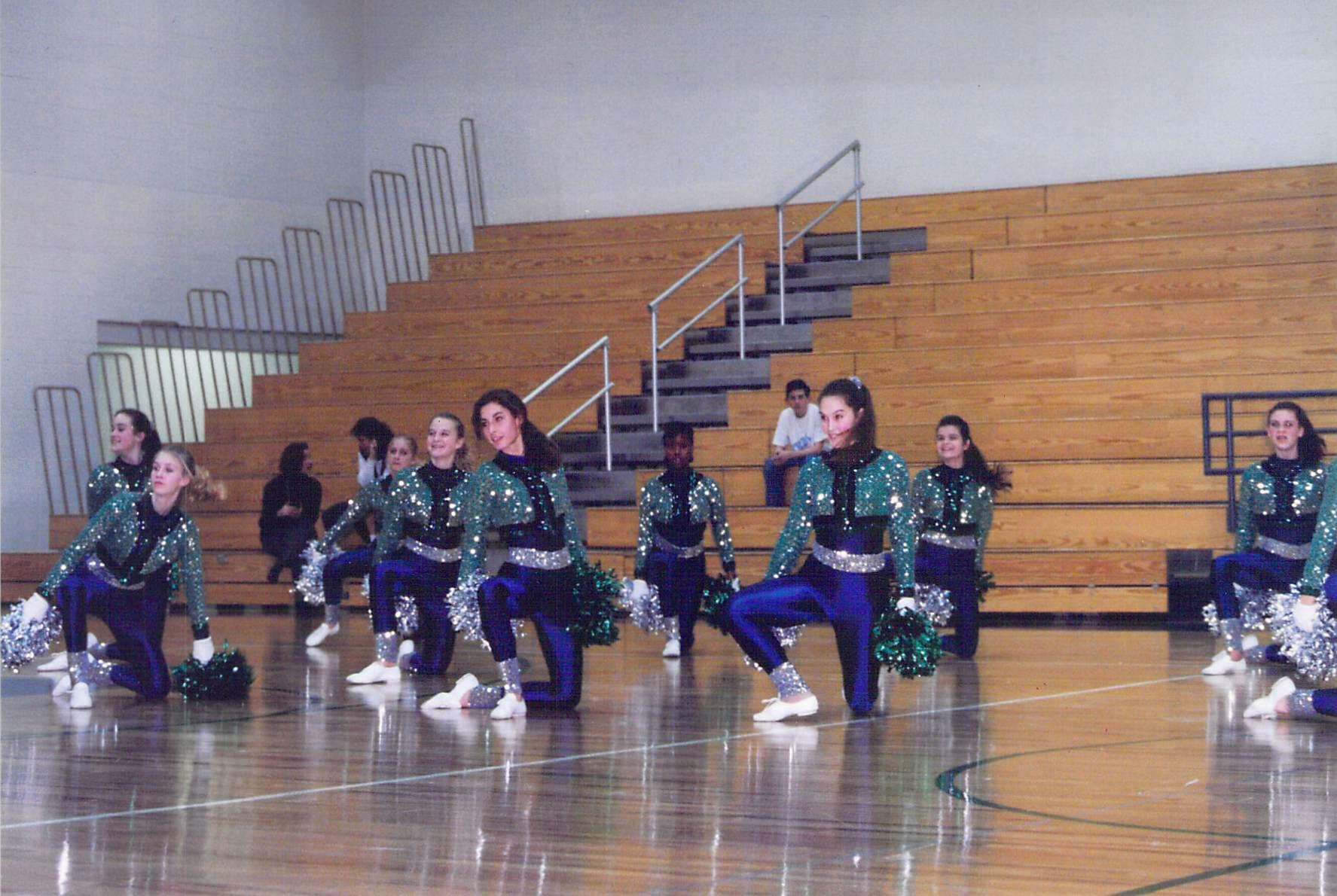
Scrapbooks were common ways to organize pictures, but their usage went down after phones became more prevalent and advanced. Radiohead, an English rock band, released the song "Creep" in 1993, which became one of the most popular songs of the year.
Hair scrunchies, a trend that re-emerged in 2020, were common to see holding up ponytails.
recalls being unable to enter the school until opening day as it was still under construction due to scheduling and budgeting conflicts. Members of committees and meetings had to congregate at neighboring schools, and the band had to rehearse there as well.
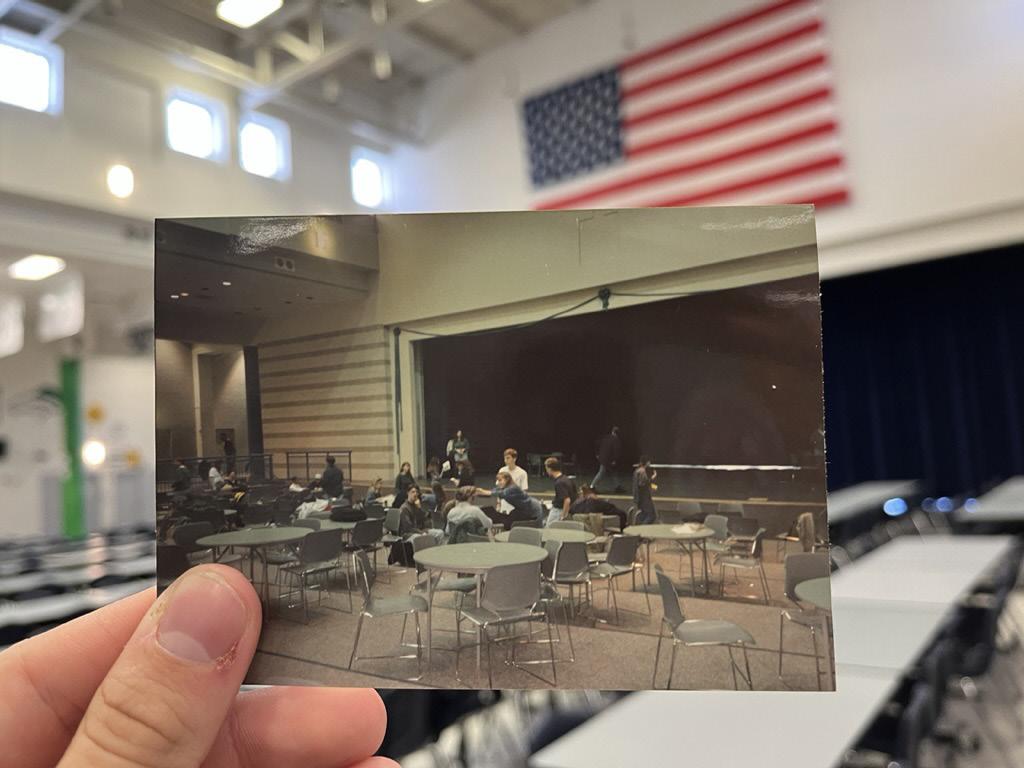
“I remember driving by MHS a month before it opened and some parts of it were still just a skeleton structure,” Dr. Knost said.
Despite talk in the community that MHS wasn't going to be done in time, the school opened to students in the fall of 1993.

“It was emotional and exciting for all of us, and we loved every minute of it,” Dr. Knost said. “It was

this mixed bag because none of us had ever opened a brand new school with a brand new identity. ”
After retiring in 2018, the Knost family has stayed connected with MHS as Kaylin Knost, Dr. Knost’s daughter, was hired in 2020 as a band teacher.
“He was over the moon when I got the job at Marquette,” Kaylin said. “After his retirement, I know he was glad to have the opportunity to stay connected to the district and specifically the Marquette quadrant through me.”
Kaylin said her father had encouraged her to join the band in sixth grade. Her love for music began with a flute that Dr. Knost picked out for her, and it eventually expanded to much of the woodwind family.
Kaylin said she always loved the school, which isn’t surprising as her parents met at MHS, where they both taught since its opening in 1993.
“Getting to work at Marquette has felt almost serendipitous,” Kaylin said. “I grew up hearing all these stories of the amazing place that Marquette was and now I’m experiencing it myself.”
While teaching, Kaylin has found artifacts from the beginning of MHS. She said the biggest band trophy they have is one her father won, where it stands
Flannels became a popular clothing item as grunge bands like Pearl Jam and Nirvana grew a large teen fan base.

Doc Martens was one brand that represented the craze for platform shoes, accompanied by Converse and Air Jordans. These shoes trends have stuck around, and can still be seen in high school hallways.
tall in the band room.
“It’s so cool to still have that for our students, and myself, to see and reflect on our past successes,” Kaylin said.
Kaitlyn Laurentius, senior, has been in the RSD since preschool. After going through elementary and middle school with Dr. Knost as superintendent, Laurentius has been in band with Kaylin since her first year.
Laurentius said she remembers Dr. Knost, especially his signature nickname “DK” that he had students and staff refer to him as.
“He was just a really good superintendent for the whole district,” Laurentius said.
Laurentius works with Kaylin in symphonic and marching band, for which she plays clarinet.
“She's a really nice teacher,” Laurentius said. “I know that everybody in the band absolutely loves her.”
Brady Payne, senior, also has ties to the opening of MHS. Payne originally lived in Florissant before his mom, Lesley Payne, Class of ‘99, moved their family back to RSD when Brady was in third grade.
“She’s a big fan of Rockwood,” Brady said. “It's one of the better school districts in the area, so she was definitely insistent.”

Brady said hearing his mother reminisce about MHS helped him feel more comfortable when he came in as a freshman. Brady also has had uncles attend MHS, one of whom was in the first graduating class.
“We've been here for a generation now,” Brady said. “And so it definitely made me a little bit more confident coming here.”
Brady said some teachers have mentioned his mom during class, such as his current art teacher Melissa Wilson who graduated from MHS in 1999. Wilson was friends with Lesley through marching band. Hotze taught Lesley German.
“There's been funny little stories, like my German teacher would show me my mom's photo in the yearbook,” Payne said. “There's definitely funny moments where it kind of leads back.”
Additional reporting by Rue Siddiqui




Apple pies, candied apples, apple crisps, and apple flavored drinks fill kitchens during autumn.


In the Midwest, most apple orchards are ready to be picked by September or at the end of August. The season wraps up in October, around Halloween.
Many people casually go apple picking every once in a while, like Carl Taraporevala, junior, who went with his family to Eckert’s Farm a few years ago.
“They tasted really good and it was really fun to pick them straight off the tree and eat them fresh,” said Taraporevala.
A popular spot for apple picking in St. Louis is Eckert’s Farm. They have locations in Millstadt, Grafton, and Belleville, Illinois.
Nevaeh Kerber, junior, also went Apple picking at Eckert’s farm this fall to fulfill her family tradition of making applesauce with her family.
Kerber’s family meets every year in the fall and use Kerber’s great-grandma’s apple peeler in order to make applesauce.
“It makes me feel really wholesome and reminds me of where my family is rooted,” said Kerber.
This year they convened on Sunday, September 10th, and made tubs of apple sauce for the family to enjoy.
“The applesauce is really good,” Kerber said. “It’s a fun thing to do with the family and it brings us together every fall.”
Apple pie is one of the staples of apple-based dishes and according to the family of Leslie Tiemeyer, FACS teacher, she makes a pretty good one.
“My sisters-in-law are always complimentary of my pie, they say ‘It’s so good, you have to make this every year!’” Tiemeyer said.
Tiemeyer makes apple pie every year for her family on Thanksgiving. She usually buys Honeycrisp apples for her filling, and the night before she makes the crust to refrigerate it. When building the pie she cuts her peeled apples into thin slices, and constructs it the day of Thanksgiving.
Another favorite apple dish that reminds Tiemeyer of fall is apple cake. Tiemeyer’s mother made it for her family every year, and her grandfather loved it. The dish consists of a regular cake with apple pieces mixed in. Unfortunately, Tiemeyer no longer has the recipe.
Waterloo Spiced Apple Sparkling Water - 8pk/12 oz cans, $4.29
2 4 5 6
Califia Farms Apple Crumble Oat Milk Coffee Creamer - 25.4oz, $4.99
3
Ghirardelli Premium Chocolate Squares Fall Assortment Bag - 6.3oz, $5.49
Werther's Original Harvest Caramel Apple Filled Hard Candies - 9.4oz, $4.99
Trader Joe's Caramel Apple Mochi - 6.8oz/$4.99
Trader Joe's Apple and Pumpkin Hand Pies8.47oz/$4.49


Standing on center stage, Jonathan Pirrello, senior, strums his guitar alongside his band Ninevolt. Pirrello taught himself to play in seventh grade and has improved his skills ever since.
Pirrello said he never listened to guitar music until he discovered Mac Demarco’s music. He was instantly inspired and fell in love with the guitar. The first song Pirrello learned was “Blue Boy,” by Demarco, which he said was easy to learn because he had fun doing it.
“I really enjoy playing guitar because it’s really easy to be expressive without being super good,” Pirrello said. “It’s the easiest songwriting tool next to piano, and it has so much versatility.”
Pirrello said he definitely believes music is going to be his feature career and already loves performing.
“It feels really cool to be up there,” Pirrello said. “We’re bringing all these people together, they really enjoy our shows and we’re making money off of it.”
Pirrello said he recommends other people learn by finding inspiration in the music they enjoy.
Ava Smith, junior, learned to play guitar during COVID-19 after receiving a guitar as a Christmas present in 2020. She said she learned through an app called Fender.
“I wanted to be able to play and sing songs at the same time,” Smith said. “I really wanted to do guitar, and Taylor Swift has been a great inspiration for me.”
Smith said she enjoys learning songs like “A Deal With God,” by Kate Bush along with songs by Ed Sheeran and country artists.
Smith said playing guitar is therapeutic and feels like a real blessing.
“Get a guitar, even if you’re just renting, and try it out with YouTube videos or Fender,” Smith said.
Sean Schierbecker, guitar teacher, learned how to play guitar through YouTube. The first song Schierbecker learned was “Buried Alive” by Avenged Sevenfold.

“I was obsessed,” Schierbecker said. “I just sat down, and I forced myself to learn that one song. By that point, my hands could do enough to make it more enjoyable.”
Schierbecker said he also enjoys playing music from Metallica and Pink Floyd.
Schierbecker said he believes everyone can give the guitar a shot by taking two simple steps.

“One, come take the class. Second, find a song that you’re passionate about, and find YouTube videos on how to play it,” Schierbecker said. “Three services are endless. Just find the one that fits you.”
• Roughly 10% of the world’s population can play guitar.

• The world’s best selling guitar is Fender.






• The first Fender Stratocaster (serial 0100) was built in April 1954.
• The guitar is the second most popular instrument in the world after the piano.
• According to a 2018 study, 50% of new or aspiring guitarists are women.
“I would want more days off for winter break. Maybe two to three weeks, like how long colleges typically do them.”
DHRUV CHAKRAVARTHULA, freshman


“I think school should have less of a summer break with almost no homework. Instead, there would be more school days to teach lessons, with no at-home assignments necessary.”
The Washington University Transgender Center abruptly ended its gender-affirming medication services on Monday, Sept. 11, due to a Missouri law signed in June that prevents transgender minors and some adults from receiving such treatment.
“This may be a really unpopular opinion, but I would have A-days every single day.”
CAS FEHRENBACH, junior

“Probably start an hour late and maybe four days a week. So, no school on Friday or Monday.”
ROHAN NAQVI, senior
“I have heard that more and more school districts are changing to four-day weeks in the state of Missouri. And so I think Rockwood should consider extending the length of our school days and changing our calendar so that we only show up to school Monday through Thursday.”
BRITNEY SHARITZ, librarian


The Center will still offer education and mental health services to transgender youths, but will no longer provide other crucial services these individuals need. The bill itself prevents healthcare providers from prescribing those under the age of 18 with gender-affirming treatments, such as puberty blockers and hormones.
identify as cisgender. The National Library of Medicine reported that 82% of transgender individuals have contemplated suicide, while 40% have attempted.
According to a survey by the National Education Association, transgender students said anti-LGBTQ laws intensified their mental-health issues. Without gender-affirming care, these statistics will rise.

The National Library of Medicine reported that 82% of transgender individuals have contemplated suicide, while 40% have attempted.
The WashU Transgender Center was the last place for transgender children and teens to receive this gender affirming care in the state of Missouri.
After repeated attacks on the transgender population, this discrimination must end.
A popular misconception is that “gender-affirming care” automatically suggests gender reassignment surgery. This is simply not true — children and teens in Missouri legally cannot be provided with gender-reassignment surgeries by their healthcare.
The WashU Transgender Center services included hormone therapy, as well as specialty care such as gynecology and urology.
Those who identify as transgender have significantly higher suicide rates than those who
Studies such as one conducted by the Trevor Project, a non profit organization that focuses on LGBTQ suicide prevention, show that fewer than one in three trans youth in the U.S. found their own home to be gender-affirming. It was also reported that LGBTQ youth who live in a community that is accepting of the LGBTQ community held significantly lower rates of attempting suicide.
There are hundreds if not thousands of transgender children under the age of 18 in Missouri right now who fear for their safety. Who are hated by their government. Who are persecuted in their communities.
There are families whose sons, daughters, brothers or sisters are not protected by their government.
These children are in danger, and these repeated attacks must come to an end.
During a visit at Harris-Stowe University on Thursday, Sept. 7, federal health officials discussed the launch of the 988 Suicide and Crisis Lifeline. Their discussion, however, brought attention to a significant issue that has been silently plaguing Black youths for years: mental health.
Suicide rates increased significantly among non-Hispanic Black American youths aged 10-24 from 2018-2021 by approximately 35.6%, according to a study by the CDC.

It is certainly no coincidence that 2018-2021 was especially difficult for African Americans youths, with prevalent incidents of police brutality and general racial unrest such as the killings of George Floyd and Ahmaud Arbery, the subsequent BLM protests and the COVID-19 outbreak.

The frequency of Black mental health problems are not only caused by racial discrimination and police killings, but also disparities in regards to healthcare.
Not only do Black Americans tend to seek mental help less than other groups, but 10% lack the health insurance to do so, according to “Black Mental Health: What You Need to Know.”
Furthermore, the lack of cultural
sensitivity with certain healthcare professionals can make Black teens feel even more isolated than they already do.
Discrimination is a major ongoing problem, and issues regarding mental health among Black teenagers should never be ignored.
As an African-American teenager, I have found myself in many conversations about the issues we face. One aspect I do not feel is spotlighted enough

With the constant advancement of artificial intelligence, conversation has shifted to whether AI tutors are effective and credible.
aiden BURKHARDT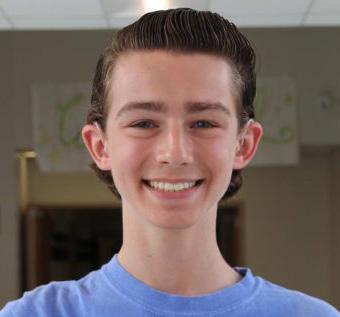


as it should be, however, is mental health and how it is tied to those issues.
Glossing over the isolation discrimination can make Black teens feel can be just as harmful as ignoring racism in its entirety.
Hopefully, there will be more conversation on Black mental health going forward. Perhaps the Harris-Stowe visit is the gateway to a larger spotlight on this issue.
eli FERGUSON
Washington University (WashU) in St. Louis has updated their financial aid policy to no longer issue federal student loans starting in the fall of 2024. Instead they will be issuing grants and scholarships in a new loan-free program.
“We want to get them here, support them during their time here, and prepare them to do great things. Now, when they graduate from WashU, they will do so debt-free,” Andrew Martin, Chancellor of WashU, said in a statement.
In a growing trend among more than 20 elite colleges across the country, loans are becoming a thing of the past. This is great news for the students of these colleges who will receive an affordable education if they qualify. But, this opportunity is only offered by non-profit institutions with large endowments. Some of the other colleges that have joined the ranks of debt-free financial aid programs are Princeton, MIT, Pomona, Wesleyan and others.
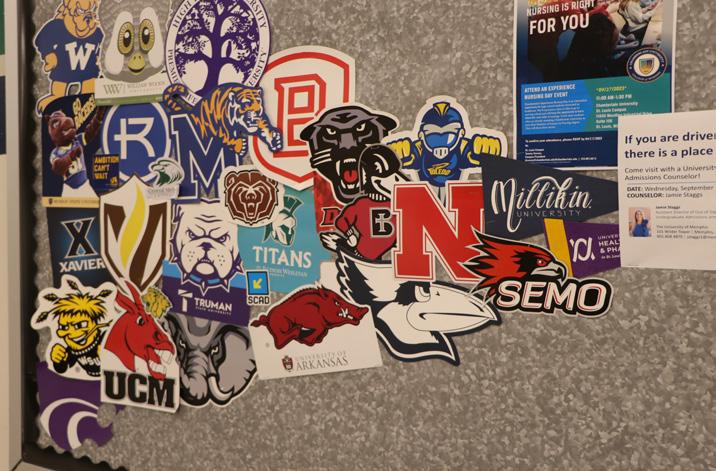
According to the Education Data Initiative, the average student owes $37,338 in student loans and the average private institution student owes $54,921 in student loans in 2023.
In a time when student loans have increased exponentially, this possibility of a debt-free education is exciting.
Student loan debt is a polarizing
issue that has plagued America for the last 30 years, with federal student loans now considered a “debt trap” as tuitions rise 134%, according to U.S. News Data.
Institutions like WashU offering debt free education is a step in the right direction for elite institutions, but for the rest of the colleges in America such as Truman State and UMSL, another solution is required.
The only reason these elite institutions are able to offer debt-free education is because their endowments are astronomically higher than others in the country. An endowment consists of the total amount of donations and assets to a college from organizations or individuals.
According to Bloomberg, WashU’s endowment was $15.3 billion for the year in 2021. The endowment of Missouri State University was $193 million in 2021, and average debt of Missouri State is $22,412, according to the U.S. News & World Report.
WashU’s total enrollment in 2023
was 15,484 while Missouri State’s enrollment in 2022 was 24,978 students. There is an unequal distribution of endowment per student, and that is the reason that elite institutions are able to create loan-free education programs.
Other solutions, like government rebudgeting and school re-budgeting, are required for the rest of the colleges in America to offer debt-free education.
There have been attempts to address indebtedness like through President Biden’s 2022 plan to provide $20,000 in student loan relief, but that was struck down by the Supreme Court.
Debt-forgiveness programs like WashU’s and Public Service Loan Forgiveness may help a little, but more is needed to ensure that all students have access to a debt-free education.
Tuitions are still sky-high, and debt will continue. While elite institutions have started figuring out loan-free programs, we must ensure other schools in America exist in the minds of both the population and lawmakers.
According to USC Schaefer, less than 2 percent of students nationwide get tutoring that meets their standard of “high quality.” This means that the vast majority of those urgently needing help are either under tutored or not tutored at all. Introducing AI tutors would mean that struggling students would have more readily available help programs compared to real-life tutors. Additionally, these AI programs would be far cheaper than in-person tutors, with one of the most prominent programs at the moment, Tutor AI, coming in at just $10/month. A prime concern with AI products like art production is that it has potential to steal human jobs and shrink the workforce, but this isn’t the case at all. AI tutoring isn’t an either-or: one can study with the help of advanced chatbots while still employing an in-person tutor.
hailey NEUNERNOTeachers find a way to make learning meaning ful through personal experience. Many students struggle to make connections without some kind of anecdote or way to relate abstract concepts to daily life. With AI’s increasing complexity, the future for a personable robot is possible, but this does not compare to the emotional connection shared between two people. What about body language? An AI tutor cannot gauge the student’s engagement, interest or understanding. What about accountability? An AI tutor puts the student in the driver’s seat, and is learning rewarding if there’s no one there to guide you through the emotional highs and lows or share in your success? Some students request a tutor because they need assistance with staying engaged. Learning online can mean computer fatigue and distractions, and who is going to hold the student accountable for paying attention? The AI tutor is for the disciplined student, not for the parent’s solution to a child’s poor school performance.

The average student owes $37,338 in student loans, while the average private institution student owes $54,921.- Initiative Photo Illustration by Elliott Jorgensen
aubrey
Makayla Cook, senior, was in strength training when Coach Charles Malloy asked her to be the varsity football manager.
Cook told him, “I’m not doing it without Kayla,” and now Kayla Gifford, senior, and Cook are the current football managers.
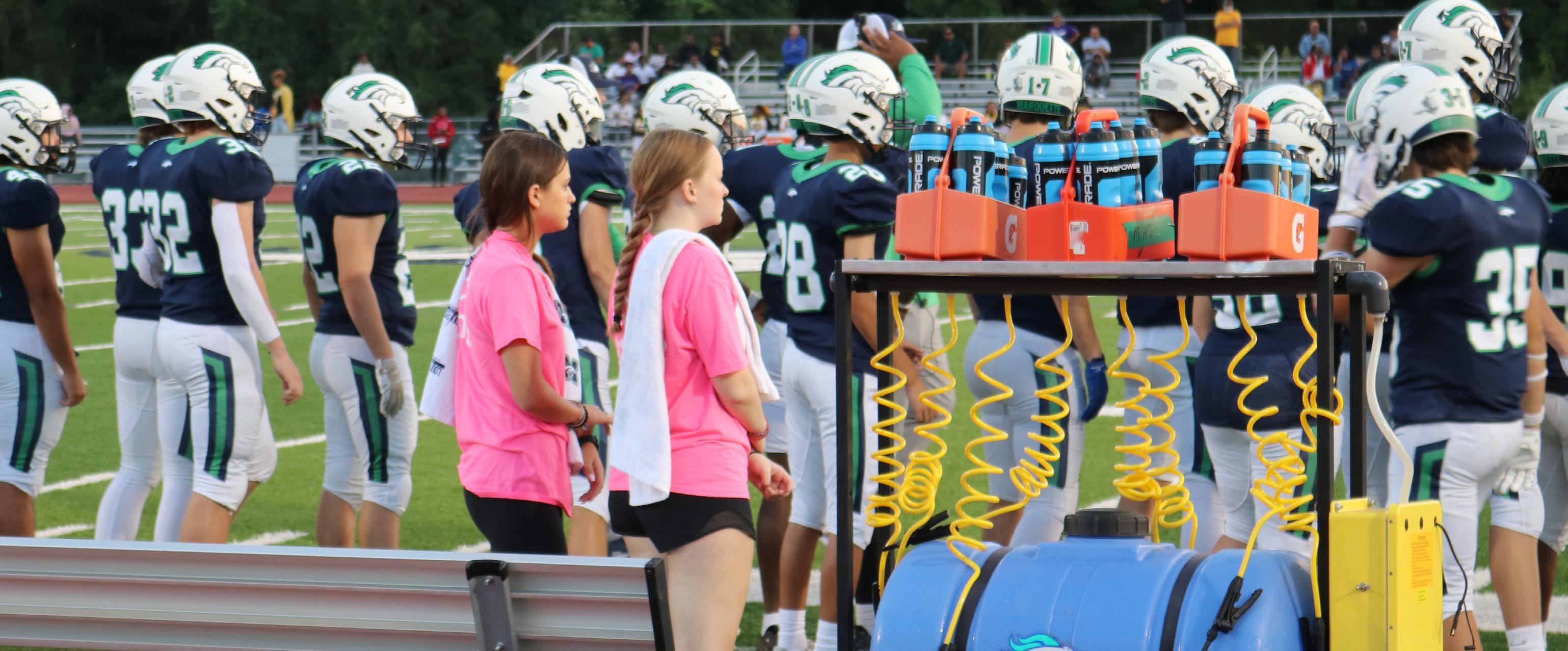
The two said they don’t have difficult jobs, but they have to do extra work during the first five games of the season.
Due to heat at the start of the season, they must fill up water bottles, bring players iced towels and make sure players have water breaks.
The Missouri State High School Athletic
Association (MSHSAA) requires water breaks during the midpoint of each quarter for the first couple games.
“We basically just help the players and team out so the coaches can worry about the game,” Gifford said.
Although Cook and Gifford have had to deal with sick and angry players and players during a losing game, being football managers has had its perks.
From free access to games to free merchandise, the girls are okay with sacrificing a couple of hours each Friday and occasionally time during practices.
Because the managers have to be on the field for the entire game, Cook and Gifford also have a sideline view.
“I mean it’s nice seeing the game up close but you
can’t really see all of it,” Gifford said. “I definitely miss being in the stands.”
Erin Sullenger, director of football operations, said she hasn’t worked directly with the managers, but they fulfill several important roles for the team. Sometimes the managers are running the drones to take video, providing water at timeouts or helping get equipment out at practices.
“A lot of times, these students have a prior relationship with one of the coaches, usually through a P.E. course,” Sullenger said, “The coaches are always looking for students who are organized, on-time, dependable, and have a lot of school spirit.”
eli FERGUSON
Taking a deep breath at the center of the football field, Sydney Moroney, junior, prepares herself to perform her favorite trick: the “Bruiser.”
The motion involves spinning a baton horizontally and then kicking it into the air. This move is just one component of her minute-long routine.
“Whenever I finish a routine without any mistakes, I feel a great sense of accomplishment, as well as relief,” Moroney said, “If I am able to avoid mistakes even while having the pressure of being in front of a crowd, I feel very proud.”
Moroney performs at junior varsity football games during halftime and varsity football games on the sidelines. The two other twirlers that performed during Moroney’s freshman and sophomore years have graduated, leaving her as the sole twirler.
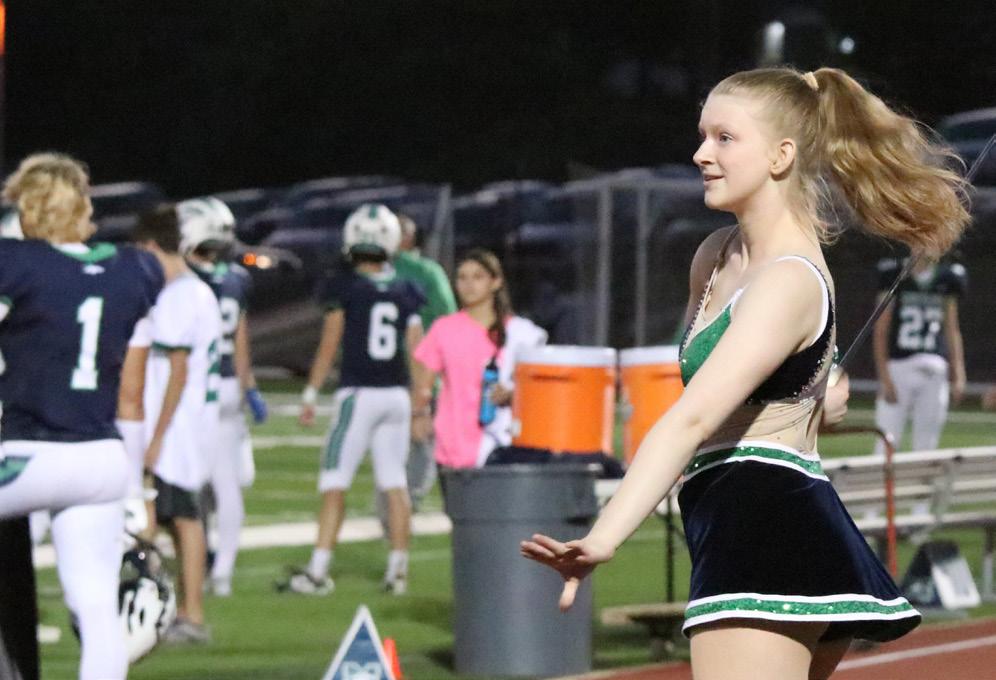
“Now that I am the only twirler at Marquette, I feel more of a pressure to do well and present an accurate representation of baton twirling to the school,” Moroney said. “However, it's also nice because I have more opportunities to perform.”
A baton twirler is not a designated role at MHS so
twirlers have to advocate for themselves in order to perform at school. When Moroney was a freshman, she spoke to the activities director, the cheer coach and the dance coach to convince them to let her perform.
Moroney is part of the more than 25-year-old Sugarbabies team led by Lisa Bartfeld, twirling coach.
Moroney started twirling when she was 8 years old in a Parkway-Rockwood Community Ed class taught by Bartfeld who is a registered judge for the National Baton Twirling Association.
“We love our unique sport,” Bartfeld said, “It requires stamina, coordination, grace, timing, accuracy, courage and so much more. Just to make it more challenging, you're implementing all of those skills with a steel rod spinning just inches above your head.”
Bartfeld attends Moroney’s school performances, along with Kim Moroney, Sydney’s mother. Kim has supported Moroney’s twirling since she started, when she was inspired to start twirling after attending a Purdue football game in the fall of 2015.
“Sydney was mesmerized by the twirlers’ halftime performance and immediately said that she was going
to learn how to twirl and was going to become a Purdue Feature Twirler,” Kim said.
Since that moment, Moroney has learned to perform well under pressure, Kim said.
“Sydney isn’t typically one who likes to bring attention to herself, but when she twirls, she can really bring it,” Kim said.
“It requires stamina, coordination, grace, timing, accuracy, courage and so much more."
Lisa Bartfeld, twirling coach
Stepping up to the plate, Brooklyn Bode, freshman, begins her high school softball career as a pitcher for the varsity team.
Bode currently plays for the Elite STL club softball team, and has been playing since she was 8 years old. However, Bode said she wouldn’t have even thought to play softball if it weren’t for her sister, Sydney Bode, junior.

“She’s set such a motivational example for me since I’ve been watching her play at games since we were little,” Bode said.
Now the sisters play together on the MHS varsity softball team, both as pitchers.

“It’s fun because we always have each other,” Brooklyn said. “If I have questions about anything, she’s always there. We’re best friends.”
Brooklyn said she enjoys playing with her sister as this is the first time they’ve officially played on a team together, but because they both play the same position, there can be competition.
This is the first season Marissa Waeckerle, assistant varsity coach, has coached the Bode sisters.
“Three pitchers graduated last year, so to have a duo of sisters that are high quality pitchers has been very important and good to have,” Waeckerle said. “We are just very happy with how they’ve done so far, and we are looking forward to what they will keep doing in the future.”
One of Waeckerle’s favorite memories of the duo was when the Bodes were warming up off to the side of a game.
“When Sydney’s back was to the field, Brooklyn always had her glove out ready to protect Sydney in case there was a foul ball,” Waeckerle said. “The girls are always there for each other, protecting each
other.”

On the j.v. team, Ally Carns, sophomore, and her twin sister, Abby Carns, sophomore, have been playing softball together since they were 5 years old, starting on a team called the Cardinals coached by their parents.
“Dad’s always coached us,” Ally said. “He’s always been a part of it, which has made it a lot of fun to play softball and continue in the sport, especially since our parents played softball and baseball when they were younger.”
Abby plays shortstop while Ally plays center field.
“Having my twin on my team always pushes me farther,” Abby said. “If I see her make a good play it’ll make me want to play good, or even play better.”
One of assistant coach Marc Ostrowski’s favorite memories of the twins was during a game against Lafayette.
“Ally made an amazing catch in center field and then turned around and threw an absolute missile to second base,” Ostrowski said. “Abby caught the ball with a full stretch to double off their runner and end the inning. They both are extremely competitive and care very much about doing well.”
hailey NEUNER ette’s season.”
The NCAA reports that a mere 6% of high school athletes take their sport to the college level, so it’s rare to find a team with more than one committed player.

The MHS volleyball team has five.
In August 2022, Mia Scanlon, senior, committed to play beach volleyball at Florida-Atlantic University.
“I decided I wanted to play beach volleyball pretty early on, which helped speed up my process,” Scanlon said.
She was the first on the team to announce her commitment.
“I’m really happy they found their home because I knew that was the goal they’ve been working towards,” Scanlon said. “Seeing them accomplish that is really exciting.”
The 2022 season came to a close at the hands of State champions Lafayette in the District Semi-Final game.
Jacey Young, senior, expects a District run to cap off her high school career. The team began their season with a 10-game winning streak.
“Our team was young last season,” Young said. “Our goal this year is definitely to be the team that ends Lafay-
Young announced her verbal commitment to Southeast Missouri State in July. Her 6’2” frame makes her the tallest on the team.
Katelyn Heitert, defensive specialist, said she is excited to see how they can pull through this season. She fell in love with Brooklyn, New York, where she will continue her volleyball career.

“The volleyball program here has brought me some of my closest friends,” Heitert said. “We’ve just been getting stronger and building the chemistry we’ve been blessed with.”
This camaraderie extends beyond the court.
The seniors are part of the strength training program, which provides the team with an opportunity to workout during the school day. Young, Ozersky and Scanlon share a weightlifting platform in one of Coach Charles Malloy’s classes.
“It’s my job to physically and mentally prepare student-athletes,” Malloy said. “Because when you have a commitment to the Weight Room, you have a commitment to yourself and the program. That spreads a work ethic that will carry you along at the collegiate level and throughout your life.”
“To have a duo of sisters that are high quality pitchers has been very important and good to have.”
Marissa Waeckerle, assistant varsity coach
 luke GRAVES
luke GRAVES
rock
This is a chalk bag. Chalk is mostly standard, and can come in a fine or coarse powder. Chalk bags come in two sizes: a smaller bag that can be worn on a belt and a chalk pot.


These shoes are La Sportiva Theories, a popular shoe among competitive climbers. These are used to step on small chips, which normal athletic shoes can’t do.
Evan Voelker, junior, remembers the moment the rock climbing club (RCC) started to feel like a community.
“The team met up for Chipotle after one of our competitions,” Voelker said. “It made me realize we were more than just people who met up to climb together, We were a strong community of friends and coaches.”
However, a new Rockwood rule requires clubs to meet on school property due to liability reasons. RCC, in the past, has held meetings at Upper Limits in Chesterfield on Sundays.

“When I heard the news that the RCC could no longer be official, I was upset,” Voelker said. “I know club members can still meet up and climb together, but it makes it more difficult to do so.”
Junior Lauren Nickel, club president, is disappointed with the new rule’s implications.
“I can understand why Rockwood would change their rules like this, but I don’t think the climbing club was really what they intended to target with it,” Nickel said. “It feels unfortunate that we’re impacted.”
“Nobody I know of has ever gotten injured at climbing club practices, and Upper Limits strongly emphasizes safety in the gyms,” Nickel said.

Brittany Sharitz, rock climbing club sponsor, said RCC offered a place for students to get active.
“It was just a very enjoyable, low commitment type of club that allowed students to compete,” Sharitz said. “It was a great way for students to get involved with something athletically if they couldn’t commit to a team sport that requires multiple hours every day.”
The end of the club doesn’t mean the end of the group or the end of climbing for the students involved.
“Upper Limits has said that they can still compete through them,” Sharitz said. “They just can’t climb under the Marquette name or under the Rockwood name.”
Nickel and Voelker are both already planning to continue climbing with the club.
“Despite the fact we cannot officially advertise in school, interest in the club has never been higher, and I still look forward to meeting up every Sunday to climb and connect with my community,” Voelker